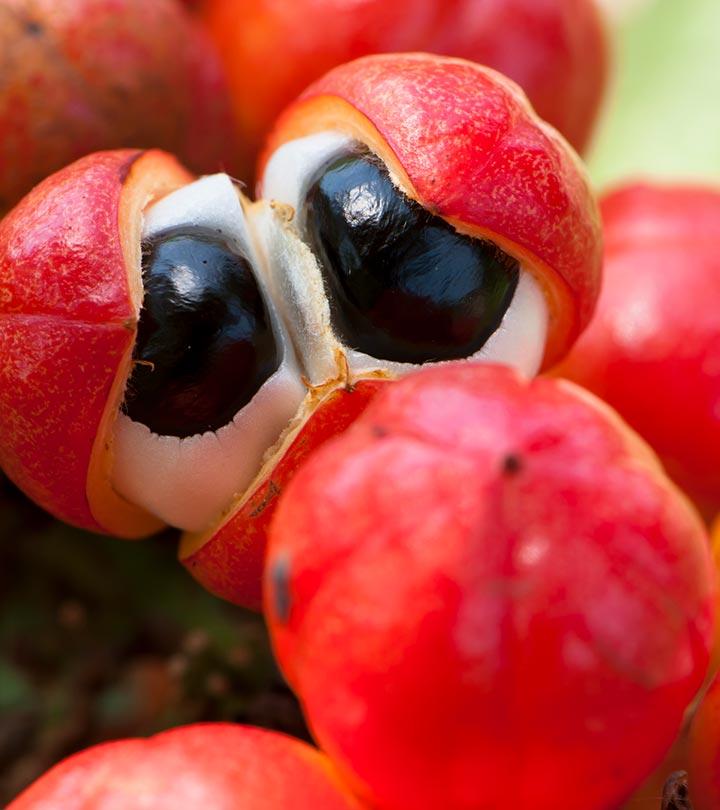Starting my journey to learning Portuguese, I knew I wanted to incorporate cultural elements into my learning, so as to create a more holistic experience. Gabi introduced me to Portuguese music as I have featured in another Culture Post. She also talked about other Brazilian foods and her absolute favorite drink: Guaraná soda.
I had heard of this drink before, but I did not know any background information on the soda or plant. The guarana plant is native to the Amazon basin and can be found in Brazil, Colombia, Venezuela, Bolivia, Guyana, and Peru. The seeds of the fruit plant contains an extremely high percentage of caffeine, around 2-8%. Compared to coffee seeds which typically contain around 1-2% caffeine. This is a slight tangent, but I took a medical botany course last semester and learned that coffee beans are actually coffee seeds. Interesting! Anyway, the caffeine in the guaraná fruit helps to fend off predators. As for the appearance, the guarana plant has green leaves with the flowerings producing fruit that are reddish orange in color.
 https://www.stylecraze.com/articles/benefits-of-guarana-for-skin-hair-and-health/
https://www.stylecraze.com/articles/benefits-of-guarana-for-skin-hair-and-health/
The guaraná fruit has been used both traditionally, medicinally, and commercially by humans. Traditionally, communities would roast the fruit seeds and make cocktails with other herbs in order to combat pain, infection, and memory loss among other health problems. The drink also helps to give the communities strength and prevent hunger pains.
In our society, people use the fruit seed’s properties in energy drinks due to its high content of caffeine. Since caffeine curbs one’s appetite, people have also been using the seed’s properties as a weight-loss supplement. The Food and Drug Administration has not approved the seed extract for weight-loss or any other medicinal reason. However, there are also studies that have shown the possibility of the seed’s composition downregulating the expression of certain genes in their role of accumulating fatty tissue. The seed also contains phytochemicals and tannins that can play a role in anti-bacterial and anti-inflammatory treatments. Generally speaking, anti-bacterial and anti-inflammatory natural supplements may reduce the amount of free radicals in the body, as well as fight bacterial infections and overall bodily inflammation.
As for the actual soda, Brazil was the first country to produce and distribute a guaraná drink. Guaraná Antarctica was founded by Pedro Baptista de Andrade in 1921 in Brazil. Today, the soda is also produced in Portugal, Argentina, and Japan. The company also makes a low-calorie version called Guaraná Antarctica Zero. When Gabi mentioned this soda, I wanted to try it. The next time I went to the grocery store, I searched around for this soda, and Publix had it in stock. I chilled it for a few hours, and when I tried it, I was very impressed. The soda was almost reminiscent of ginger ale, my favorite soda, but with a twist. There were somewhat sweetish, fruity, cherry-ish tastes going on. When we transitioned to online learning, I had to go grocery shopping for my family one day. I went to Wegmans, and they had the Guaraná Antarctica in stock, so I got a pack of twelve and brought them home for my parents to try. It was nice to have a little connection to my Portuguese learning right there at home.

Replies
Hi Alana!
I had never heard of the guarana plant or the soda before this post but now I really want to try it! I love ginger ale too so I am very curious to try the soda. I'm glad you could share this with your family. I was really surprised to read about the plant's high caffeine content. I had no idea that the caffeine in these plants was actually a defense mechanism, but it's very interesting. Your medical botany course actually sounds really interesting too and I'm happy to read about the science associated with this plant. I wonder how effectively the plant actually is in doing what it is marketed to accomplish. This drink also made me think about how UR's campus is obsessed with the caffeinated drink, Yerba Mate. Maybe this guarana drink will become the next Yerba Mate! Thanks for sharing this post, Alana!